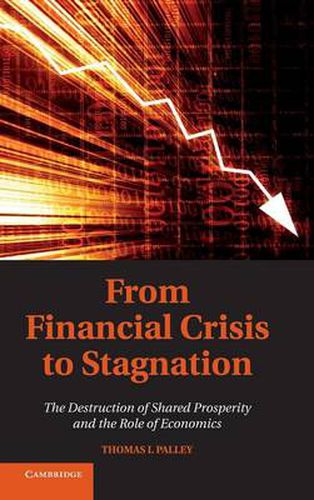Readings Newsletter
Become a Readings Member to make your shopping experience even easier.
Sign in or sign up for free!
You’re not far away from qualifying for FREE standard shipping within Australia
You’ve qualified for FREE standard shipping within Australia
The cart is loading…






The US economy today is confronted with the prospect of extended stagnation. This book explores why. Thomas I. Palley argues that the Great Recession and destruction of shared prosperity is due to flawed economic policy over the past thirty years. One flaw was the growth model adopted after 1980 that relied on debt and asset price inflation to fuel growth instead of wages. A second flaw was the model of globalization that created an economic gash. Third, financial deregulation and the house price bubble kept the economy going by making ever more credit available. As the economy cannibalized itself by undercutting income distribution and accumulating debt, it needed larger speculative bubbles to grow. That process ended when the housing bubble burst. The earlier post-World War II economic model based on rising middle-class incomes has been dismantled, while the new neoliberal model has imploded. Absent a change of policy paradigm, the logical next step is stagnation. The political challenge we face now is how to achieve paradigm change.
$9.00 standard shipping within Australia
FREE standard shipping within Australia for orders over $100.00
Express & International shipping calculated at checkout
Stock availability can be subject to change without notice. We recommend calling the shop or contacting our online team to check availability of low stock items. Please see our Shopping Online page for more details.
The US economy today is confronted with the prospect of extended stagnation. This book explores why. Thomas I. Palley argues that the Great Recession and destruction of shared prosperity is due to flawed economic policy over the past thirty years. One flaw was the growth model adopted after 1980 that relied on debt and asset price inflation to fuel growth instead of wages. A second flaw was the model of globalization that created an economic gash. Third, financial deregulation and the house price bubble kept the economy going by making ever more credit available. As the economy cannibalized itself by undercutting income distribution and accumulating debt, it needed larger speculative bubbles to grow. That process ended when the housing bubble burst. The earlier post-World War II economic model based on rising middle-class incomes has been dismantled, while the new neoliberal model has imploded. Absent a change of policy paradigm, the logical next step is stagnation. The political challenge we face now is how to achieve paradigm change.